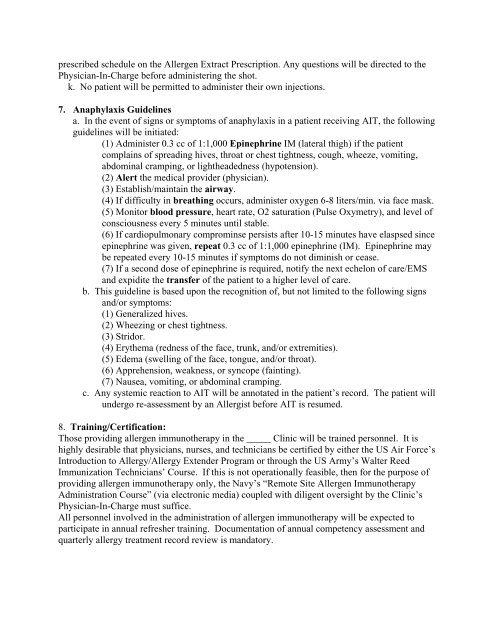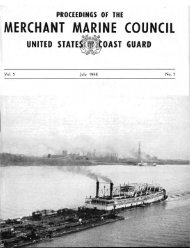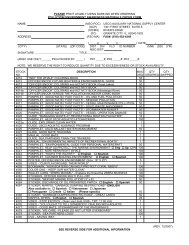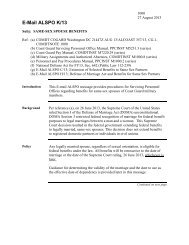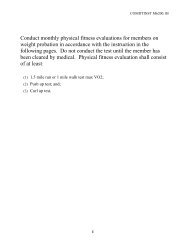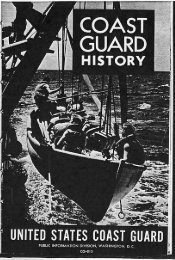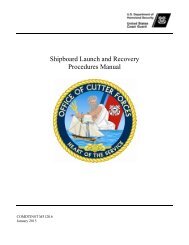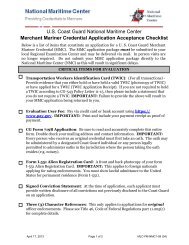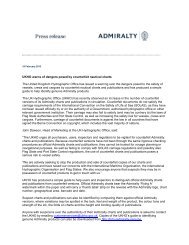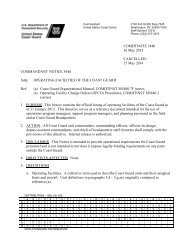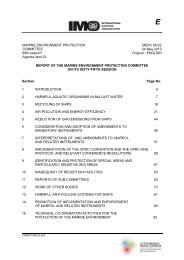Immunotherapy Safety for the Primary Care ... - U.S. Coast Guard
Immunotherapy Safety for the Primary Care ... - U.S. Coast Guard
Immunotherapy Safety for the Primary Care ... - U.S. Coast Guard
You also want an ePaper? Increase the reach of your titles
YUMPU automatically turns print PDFs into web optimized ePapers that Google loves.
prescribed schedule on <strong>the</strong> Allergen Extract Prescription. Any questions will be directed to <strong>the</strong><br />
Physician-In-Charge be<strong>for</strong>e administering <strong>the</strong> shot.<br />
k. No patient will be permitted to administer <strong>the</strong>ir own injections.<br />
7. Anaphylaxis Guidelines<br />
a. In <strong>the</strong> event of signs or symptoms of anaphylaxis in a patient receiving AIT, <strong>the</strong> following<br />
guidelines will be initiated:<br />
(1) Administer 0.3 cc of 1:1,000 Epinephrine IM (lateral thigh) if <strong>the</strong> patient<br />
complains of spreading hives, throat or chest tightness, cough, wheeze, vomiting,<br />
abdominal cramping, or ligh<strong>the</strong>adedness (hypotension).<br />
(2) Alert <strong>the</strong> medical provider (physician).<br />
(3) Establish/maintain <strong>the</strong> airway.<br />
(4) If difficulty in breathing occurs, administer oxygen 6-8 liters/min. via face mask.<br />
(5) Monitor blood pressure, heart rate, O2 saturation (Pulse Oxymetry), and level of<br />
consciousness every 5 minutes until stable.<br />
(6) If cardiopulmonary comprominse persists after 10-15 minutes have elaspsed since<br />
epinephrine was given, repeat 0.3 cc of 1:1,000 epinephrine (IM). Epinephrine may<br />
be repeated every 10-15 minutes if symptoms do not diminish or cease.<br />
(7) If a second dose of epinephrine is required, notify <strong>the</strong> next echelon of care/EMS<br />
and expidite <strong>the</strong> transfer of <strong>the</strong> patient to a higher level of care.<br />
b. This guideline is based upon <strong>the</strong> recognition of, but not limited to <strong>the</strong> following signs<br />
and/or symptoms:<br />
(1) Generalized hives.<br />
(2) Wheezing or chest tightness.<br />
(3) Stridor.<br />
(4) Ery<strong>the</strong>ma (redness of <strong>the</strong> face, trunk, and/or extremities).<br />
(5) Edema (swelling of <strong>the</strong> face, tongue, and/or throat).<br />
(6) Apprehension, weakness, or syncope (fainting).<br />
(7) Nausea, vomiting, or abdominal cramping.<br />
c. Any systemic reaction to AIT will be annotated in <strong>the</strong> patient’s record. The patient will<br />
undergo re-assessment by an Allergist be<strong>for</strong>e AIT is resumed.<br />
8. Training/Certification:<br />
Those providing allergen immuno<strong>the</strong>rapy in <strong>the</strong> _____ Clinic will be trained personnel. It is<br />
highly desirable that physicians, nurses, and technicians be certified by ei<strong>the</strong>r <strong>the</strong> US Air Force’s<br />
Introduction to Allergy/Allergy Extender Program or through <strong>the</strong> US Army’s Walter Reed<br />
Immunization Technicians’ Course. If this is not operationally feasible, <strong>the</strong>n <strong>for</strong> <strong>the</strong> purpose of<br />
providing allergen immuno<strong>the</strong>rapy only, <strong>the</strong> Navy’s “Remote Site Allergen <strong>Immuno<strong>the</strong>rapy</strong><br />
Administration Course” (via electronic media) coupled with diligent oversight by <strong>the</strong> Clinic’s<br />
Physician-In-Charge must suffice.<br />
All personnel involved in <strong>the</strong> administration of allergen immuno<strong>the</strong>rapy will be expected to<br />
participate in annual refresher training. Documentation of annual competency assessment and<br />
quarterly allergy treatment record review is mandatory.


